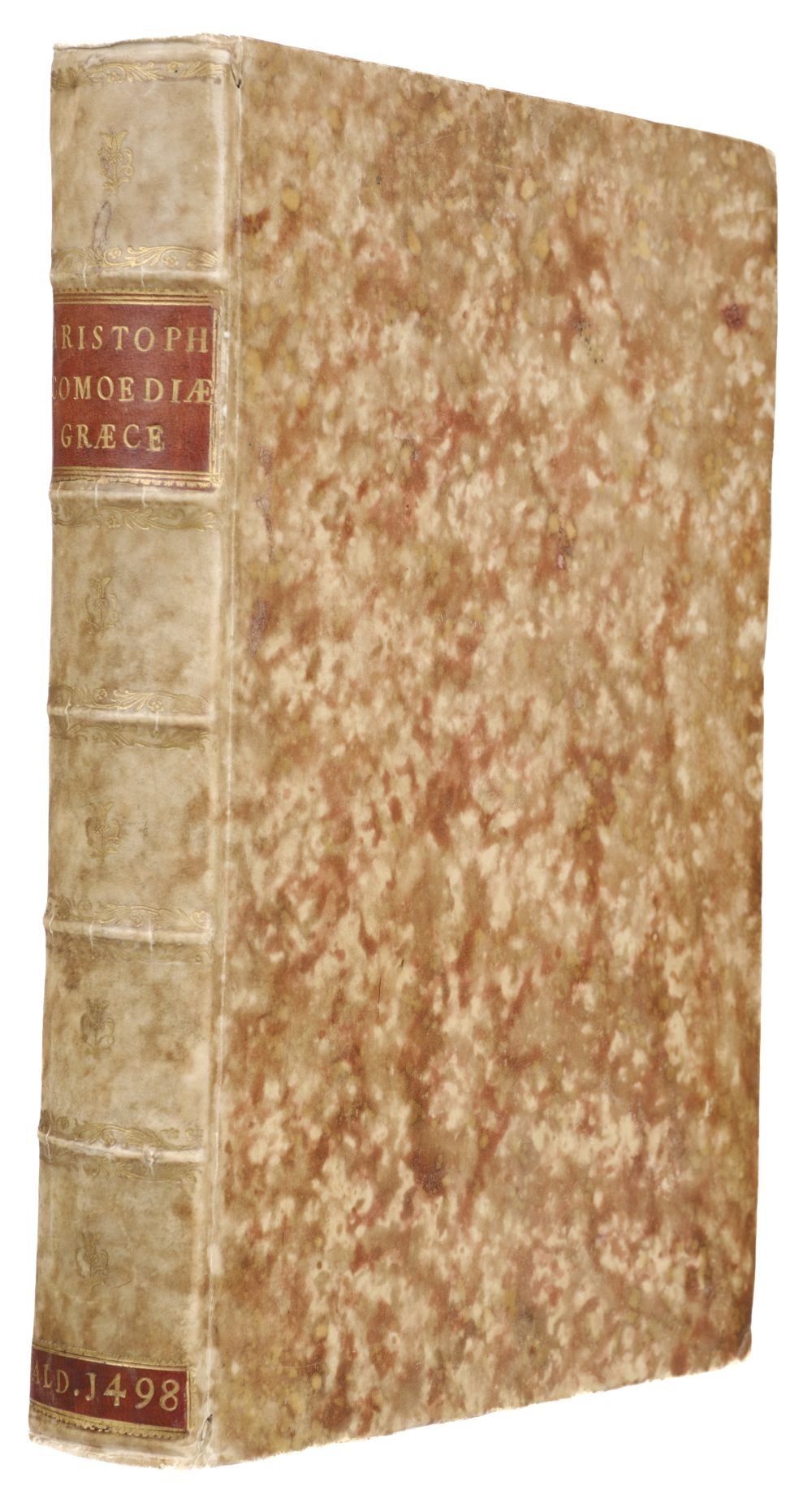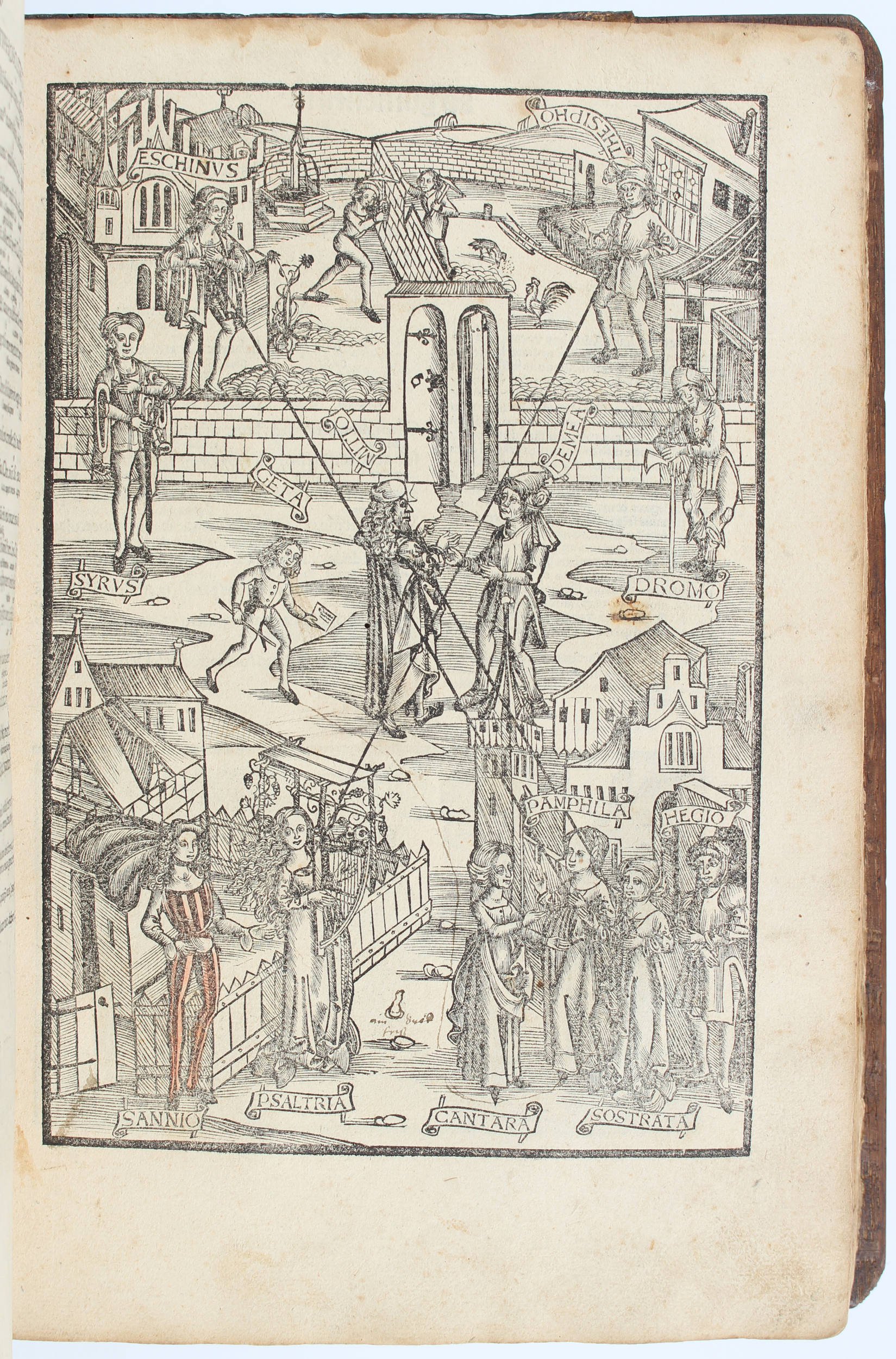Terence, Comoediae, in Latin, illuminated humanist manuscript on paper and parchment [Italy (probably Florence), dated 4 April 1446] 94 leaves (plus a later paper endleaf at each end), wanting one gathering between original foliation 12 and 25 (with text from end of Andria I curabo & mecum adductum … to opening of Euriuchus II … Operam adjuvabo numquid, written space 172 by 110mm.), else complete, collation: i-vii12, ix10 (last two blank cancels), contemporary foliation, parchment bifolia innermost and outermost in gathering, single column of 30 lines in an excellent and accomplished humanist hand, verse opening each line with a capital, running titles and rubrics in faded red, simple and elegant red or turquoise-blue initials, seven initials in burnished gold on blue, green and dark pink grounds, each heightened with white or yellow swirls of foliage, watermark of the common version of Golgotha (a tri-lobed mountain surmounted by a cross), very occasional missing lines added vertically in margins by main scribe, some marginal notes in Latin and Italian and a small amount of underlining from later readers, some smudges, small amount of worm damage in gutter, small spots and stains with first and last leaves discoloured at edges, a few small tears to edges of paper leaves, overall in good condition, 230 by 170mm.; eighteenth- or nineteenth-century limp parchment binding with Teren/tii Affri /Comed in pen on spine A handsome Renaissance copy of one of the most widely read classics of the Ancient World, probably from the town in which the text was performed again for the first time since antiquity Provenance: The colophon at the end of the text states that the book was completed on 4 April 1446, and the style of the tri-colour illuminated initials strongly suggests that this was done in Florence or its vicinity (compare, for example, that in a Florentine Cicero made c. 1475-90, once Major Abbey, J.A. 3208: J.J.G. Alexander and A.C. de la Mare, The Italian Manuscripts, 1969, no. 21; and copies of the works of Marsilio Ficino from that city, now in the Laurenziana, Plut. 82.15 and 82.11, both from last decades of the fifteenth century: Renaissance Florence: The Age of Lorenzo de Medici, 1993, pp. 133 and 135). Text: Terence (more properly Publius Terentius Afer, c. 195/185-c. 159 BC.) is one of the most well known Roman playwrights. He was of Berber origin from Carthage, and was brought to Rome by the senator Terentius Lucanus as a slave and then educated and freed. He disappeared during a visit to Greece when only twenty-five years old, and it is presumed he died on the trip. Despite this short life, his literary impact has been enormous. His works were performed in Rome for the first time in 170-160 BC. and have remained popular throughout the centuries to the present day. Due to this popularity and the endurance of his appeal, all six of his works survive, the comedies: Andria (The Girl from Andros, a comedy adapted from Menander and in the genre of forbidden marriage and star-crossed lovers); Hecyra (The Mother-in-Law, again adapted from Menander as well as Apollodorus of Carystus, in which male debauchery is concealed and then exposed with the figure of the mother-in-law as the catalyst for that revelation); Heauton Timorumenos (The Self-Tormentor, another tale of star-crossed lovers separated by parental disapproval, war and then the practicalities of the world); Phormio (The Parasite, revolving around a young man who makes his living performing duties for the wealthy, and who turns his talents to helping two young men with their respective romantic problems); Eunuchus (The Eunuch, again adapting a similar play by Menander, centring on a complex love affair between an Athenian man and a foreign born courtesan); and Adelphoe (The Brothers, which explores methods of child rearing both strict and permissive through two brothers separated at birth). All of these were written between 166 and 160 BC. His texts were used throughout
Terence, Comoediae, in Latin, illuminated humanist manuscript on paper and parchment [Italy (probably Florence), dated 4 April 1446] 94 leaves (plus a later paper endleaf at each end), wanting one gathering between original foliation 12 and 25 (with text from end of Andria I curabo & mecum adductum … to opening of Euriuchus II … Operam adjuvabo numquid, written space 172 by 110mm.), else complete, collation: i-vii12, ix10 (last two blank cancels), contemporary foliation, parchment bifolia innermost and outermost in gathering, single column of 30 lines in an excellent and accomplished humanist hand, verse opening each line with a capital, running titles and rubrics in faded red, simple and elegant red or turquoise-blue initials, seven initials in burnished gold on blue, green and dark pink grounds, each heightened with white or yellow swirls of foliage, watermark of the common version of Golgotha (a tri-lobed mountain surmounted by a cross), very occasional missing lines added vertically in margins by main scribe, some marginal notes in Latin and Italian and a small amount of underlining from later readers, some smudges, small amount of worm damage in gutter, small spots and stains with first and last leaves discoloured at edges, a few small tears to edges of paper leaves, overall in good condition, 230 by 170mm.; eighteenth- or nineteenth-century limp parchment binding with Teren/tii Affri /Comed in pen on spine A handsome Renaissance copy of one of the most widely read classics of the Ancient World, probably from the town in which the text was performed again for the first time since antiquity Provenance: The colophon at the end of the text states that the book was completed on 4 April 1446, and the style of the tri-colour illuminated initials strongly suggests that this was done in Florence or its vicinity (compare, for example, that in a Florentine Cicero made c. 1475-90, once Major Abbey, J.A. 3208: J.J.G. Alexander and A.C. de la Mare, The Italian Manuscripts, 1969, no. 21; and copies of the works of Marsilio Ficino from that city, now in the Laurenziana, Plut. 82.15 and 82.11, both from last decades of the fifteenth century: Renaissance Florence: The Age of Lorenzo de Medici, 1993, pp. 133 and 135). Text: Terence (more properly Publius Terentius Afer, c. 195/185-c. 159 BC.) is one of the most well known Roman playwrights. He was of Berber origin from Carthage, and was brought to Rome by the senator Terentius Lucanus as a slave and then educated and freed. He disappeared during a visit to Greece when only twenty-five years old, and it is presumed he died on the trip. Despite this short life, his literary impact has been enormous. His works were performed in Rome for the first time in 170-160 BC. and have remained popular throughout the centuries to the present day. Due to this popularity and the endurance of his appeal, all six of his works survive, the comedies: Andria (The Girl from Andros, a comedy adapted from Menander and in the genre of forbidden marriage and star-crossed lovers); Hecyra (The Mother-in-Law, again adapted from Menander as well as Apollodorus of Carystus, in which male debauchery is concealed and then exposed with the figure of the mother-in-law as the catalyst for that revelation); Heauton Timorumenos (The Self-Tormentor, another tale of star-crossed lovers separated by parental disapproval, war and then the practicalities of the world); Phormio (The Parasite, revolving around a young man who makes his living performing duties for the wealthy, and who turns his talents to helping two young men with their respective romantic problems); Eunuchus (The Eunuch, again adapting a similar play by Menander, centring on a complex love affair between an Athenian man and a foreign born courtesan); and Adelphoe (The Brothers, which explores methods of child rearing both strict and permissive through two brothers separated at birth). All of these were written between 166 and 160 BC. His texts were used throughout














Try LotSearch and its premium features for 7 days - without any costs!
Be notified automatically about new items in upcoming auctions.
Create an alert